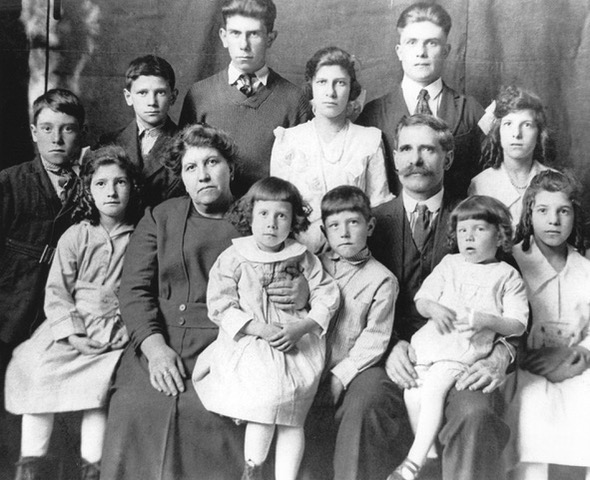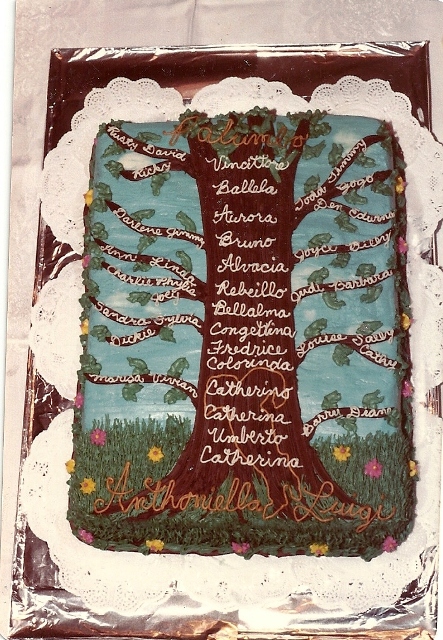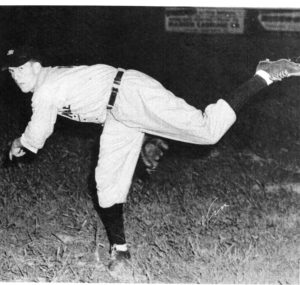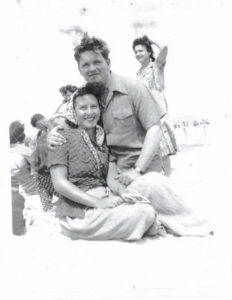July 11, 2022
Welcome to Frairy Street, running from North Street, past Baker’s (Meetinghouse) Pond, underneath a small railroad bridge, through the first Italian-American neighborhood in the town of Medfield, and ending at Dale Street.
Walking there a century ago you might well have seen men from the old country gathered on their front doorsteps speaking Italian with their voices and excitedly waving their hands and arms in the air and they reminisced about life in the old country.
Continuing down the street after 1933 your next stop may have been the Rossi family’s Frances Cafe. At the Frances you’d see patrons sitting in large comfortable booths, enjoying spaghetti and meatballs, veal and chicken parm, or any other food smothered in chops with different pastas.

While continuing down throughout this neighborhood you’ll quickly notice that this street is home to many Italian families like the Palumbos and the Iafollas, as well as the Procaccini and DiMezza families and a few other townspeople, like the Belmonts, of different nationalities. If one got to know these people as friends it was certain that they’d enthusiastically remind the many that their countrymen produced pizza, Michelangelo, Tony Soprano, and great Italian pastry tradition – sometimes purchased locally or sent in from the North End of Boston.
The Palumbo family had a joyfulness along with a certain stature and a cast of many industrious characters, beginning with Luigi and Antoinette Palumbo, who landed at Ellis Island at the turn of the 20th century with their two oldest sons, Robert and William. (Two daughters had been buried in Italy.) The small family found their way to Medfield, settled at 59 Frairy Street, and produced 10 more little Palumbos. Patriarch Luigi was a shoemaker by profession and set up a shop where Larkin’s Liquor Store is today. Antoinette was an endearing homemaker who ran the household with 10 children.
Uncle Bob Palumbo changed his last name to Palson in part because of anti-Italian (and general anti-immigrant*) sentiment that grew from the sensational trial of Sacco and Vanzetti, two Italian men falsely accused of murder in the 1920s. Uncle Bob was a graduate of Harvard University and taught classes at Boston Trade High School. He was a brilliant man who was a devoted husband to wife Polly Iafolla and benevolent father to their son, Barry and daughter, Diane.
The Palson family lived in Arizona in the early 1950s because Uncle Bob’s asthma called for a drier climate. Later in the 1950s the family lived on Burbank Street in Boston, close to the Berkelee School of Music, before moving into a small trailer on Uncle Bob’s brother, Rebel Palumbo’s property on Frairy Street. In 1968 the Palson family moved to High Street. Uncle Bob was a brilliant man of many talents and could speak on a multitude of topics. He was a humorist and life scientist who very much liked the agricultural setting where he settled his family back in those late 60s.
Rebel Palumbo started Palumbo Oil in the back yard of the Palumbo property at 57 Frairy Street, and it developed into a thriving business. Daughters Ann and Linda helped run it.
Uncle Rebel was a very generous and thoughtful man. During one summer in the late 1950s, Rebel had a cement foundation built about fifty yards away from the back of his home. Originally Rebel planned to build a house there, but he changed his mind. However, he soon decided to convert the foundation to a waist-deep swimming pool, with a water filter, for the neighborhood kids and families.

Uncle Bill Palumbo ran the shoe repair shop next to Larkin’s Wine and Spirits in Medfield center, and he also started the Palumbo Insurance Company now on West Street. Bill also coached Medfield Little League. He loved baseball just like all his siblings and enjoyed watching the Boston Red Sox whenever he could. He was definitely a student of the pastime with all of the game’s complexity. Bill would watch a baseball game on ESPN television at night and then watch the same game the next day when it was repeated on the sports channel.
Uncle Bill knew his football as well and in 1967 seemed to know that it would be two or three years before the American Football League could play competitively on the field against the National Football League. His prediction turned out to be true because the Green Bay Packers beat the Kansas City Chiefs 35-10 in the first Superbowl. Uncle Bill was thrifty as well and would always check the stock market on a daily basis after reading about it in the Herald.
Uncle Bill married a beautiful Italian woman whom we all called Auntie Dora. She loved Bill and their two daughters, Marisa and Vivian. We remember that during the week-long blackout in 1954 of Hurricane Carol, Auntie Dora would cook outside, campfire-style, making frittata, an Italian food made from an egg omelet with cheese folded into the inside of the eggs. The frittata was delicious and soon became a great breakfast favorite with all of Bill and Dora’s nieces and nephews.
Aunt Dolly and Uncle Alfred Colantonio lived nearby on North Street. Their house had plenty of room to raise their three very photogenic daughters, Louise, Sally, and Cathy. Aunt Dolly ran the household and worked at the hat factory, now the site of the Montrose School. Louise married Phillip Baker in the mid-50s. The wedding took place at the old St. Edward’s Church, which stood next to the library in the spot where the gazebo and performance area is now. Deidre Flaherty was the flower girl. The reception was at the American Legion Hall on Pleasant Street, now the site of the Medfield Gardens apartment complex. It was a huge reception, and even now we enjoy watching the color movie that the photographer made.
Aunt Alvie Palumbo was an accountant who remained single until her early 40s, when she married Chester “Chet” Plasko, in a big ceremony at the same church in Medfield center. Her sister, Aurora “Dee” Flaherty, was the bridesmaid, and Todd and Tim Flaherty were the two altar boys. Aunt Alvie and Chet ran the Norwood Book and News Store on Main Street in Norwood center. Aunt Alvie was welcomed into the Plasko family and instantly bonded with Chet’s two children, teenager Joyce and young Billy.
Uncle Bruno Palumbo was the third-youngest child of Luigi and Antoinette. Like all his siblings, he enjoyed sports. Uncle Bruno and Aunt Lillian lived in Chelsea, where their children, Darlene and Jimmy, were born. In the mid-1950s they decided to move to Medfield, which they thought was a better place to raise children, and Darlene and Jimmy became good students there. Uncle Bruno became a bank vice president, while Aunt Lillian was the homemaker.
Remembering My Aunt Balame
What would be an early recollection of my Aunt Balame? That’s easy! When she would come to our house in Medfield to visit my mom, who was her younger sister, Aunt Balame would frequently slip into speaking Italian. My mother didn’t speak fluently like Aunt Balame, but Mom understood Italian and knew what Aunt Balame was saying.
Aunt Balame and Uncle Johnny Piattoni lived in a large brown house with white trim on route 1-A in Walpole with their daughters, Judy and Barbara. The house was very big and right out of the fifties style.
Uncle Johnny enjoyed buying the latest televisions. The most unusual one looked like a stereo console. It had a lid on top with a large mirror. Click here to see what it looked like. That television was a unique novelty item and fun to play around with.
Aunt Balame had a parakeet named Bobbie whom she let fly around the inside of the house. She bought a Chow puppy, an unusual Chinese breed, and named him Doe-Doe. He reminded nearly everyone of a lion, as the fur around his face and neck was fluffy with narrow slanted facial features, making him appear somewhat noble. He became Aunt Balame’s faithful travel companion, riding in the front seat with his head out the right front window.
Aunt Balame liked to cook, with a particular preference for Italian cuisine of course. Aunt Balame used to prepare calamari in her tomato sauce whenever she and Uncle Johnny wanted to eat some with their spaghetti. The Flaherty kids were young and adventurous, so we were willing to try the calamari. Much to our surprise, calamari tasted a lot like chicken, and it reminded us of our mother’s chicken cacciatore.
Just two or three years later while down at her cottage in Buzzards Bay, Cape Cod, we were able to watch Aunt Balame make homemade raviolis, gnocchi and other pasta. She would get her rolling pin out and start making the dough on the cloth covered kitchen table. She would make them on a Saturday to be served the following day, for Sunday dinner. Those afternoons were festive, all Italian without the toil.
They bought a simple, uninsulated cottage in Buzzards Bay in the 1950s, with no lawn, but sand on all sides. Vacationing just right across the street in their cottage from Aunt Balame were my mom’s other sister, Aunt Connie and Uncle Johnny Panaro. Aunt Balame and Uncle Johnny Piattoni also owned another cottage nearby, so the Flaherty family was sometimes able to vacation at that cottage for a week at a time.
At nearby Onset Beach, I had my first experience digging for clams. I’d look for bubbles in the sand and dig down for about six inches. If you didn’t find any clams, then you still got plenty of sand and salt water. The first time I dug for clams, I was able to find 13 of them. Aunt Balame playfully told me that the number 13 was an unlucky one, urging me to find more the next time. Clams were sold all over the Cape, and the fried clams were especially good.
In the mid-1950s pizza was beginning to get popular. There were only a very few restaurants on the Cape that made pizza, but it tasted better than what is sold today. It was made Italian style with a nice thin crust. Pizza was a treat bought on special occasions, not the preference then that it is now.
Sometimes Aunt Balame would load us all up in her car and drive down to the Dainty Maid, a restaurant that made their own ice cream. Two of the other favorite landmarks on Main Street were the Leaning Tower of Pisa and the Planter’s Peanut Shop, with a giant replica of the popular Mr. Peanut figure.
When we were all down on the Cape in the summer months, the radio used to play Patti Paige’s called “Old Cape Cod.” We would come to agree with the lyrics, “You’re sure to fall in love with old Cape Cod.”
On the Cape in the 1950’s, there were no supermarkets at all, but many small independent “Mom and Pop” grocery stores like Glad’s Market near Aunt Balame’s cottage. It was small inside, but it had almost everything you’d need: bread, milk, eggs, cold cuts, frozen foods, butter, coffee, sodas, soap…and newspapers.
Aunt Balame gave all her family an abundance of love and devotion that she always displayed unabashedly. The last time I saw her was when she was on her death bed at her daughter’s house in Franklin. She left this world, surrounded by all her grandchildren, her daughters and other family members, all reaching out to comfort and hold her one final time.
Aunt Balame gave us fond memories that energized and enriched our lives by making our world and times comically different, a little brighter and one with a greater sense of love and family.
Vincent Palumbo – War Hero, Family Man, Community Activist, and Godfather
Uncle Vincent Palumbo was nearly tireless and driven in his pursuit of excellence. What do you say about a man who goes off to war and flies numerous bombing missions over Nazi Germany?
What do you say about a man who lost his friends and fellow pilots who were shot down over enemy territory and never seen again? Nothing could make a man forget that.
Many wondered where the evil of World War Two came from. Who were those assassins who wanted to kill freedom and democracy? Vin Palumbo’s mission and wish was to eliminate those who sought to destroy us.
How do you remember the spirit and courage of that man who knew that he could have been shot down from the sky at any time? At that time in history, Americans thought they were in a family of peaceful nations that respected one another but then broke apart. The Second World War turned people and nations against one another, each standing in the darkness of one another. What evil kept noble people from reaching out and touching the salvation?
After returning home Vin knew that many people were looking for deliverance from the trauma of war. He found an inner peace, became a role model, and then made an island of prosperity for his family and those around him. He honored his mother and father as well as all his brothers and sisters. In what seems like a quick flash of time, he married, raised a family, and ran a successful business, Palumbo Liquors, with large stores in Medfield and Walpole.
He was a decorated veteran, and he marched on nearly every Memorial Day when possible. He gave generously to charity and to those he loved. He showed a unique confidence, and we learned from his experience, and our lives forever changed. I came to understand and appreciate his nature and learn from the wisdom he shared. He lived an exemplary life and left us with a wonderful legacy and is remembered by his family, friends, and community.
His love for Muriel was eternal. Muriel was the rock in Vin’s life, and he would give her great credit for their success. The day he was honored at Medfield High School on June 2, 2006, Vin said that he “couldn’t have done it without her.”

Uncle Vin aspired to be a Major League pitcher, and he started out playing for the Boston Braves minor league team. One day he pitched to Ted Williams during a spring training game against the Red Sox. He held Ted to a ground ball single hit to left field.
The dream of a career in baseball was short lived, as he and Muriel wanted to start a family. They raised three sons, Rusty, David, and Ricky. With their legacy each of them prospered in business much the same as their father.
Vin Palumbo vowed to make sure his family would one day live the American dream by making their world what it is today. The man, who was once a businessman, became Vin Palumbo the philanthropist, humanitarian, and community activist. He was exemplary of many of the veterans who returned home after the war. While sincere and self-effacing about his wartime experience, Vin proudly spoke of his deep admiration of fellow World War II soldiers.
As our Godfather, Vin Palumbo spoke of how one day perhaps young Americans would never have to endure the hardship of going off to a foreign land to fight in combat. He realized that before all the politics in this world, there was humanity. With this enlightenment, “let us look out through his soul and eyes. Look out at the things he made, all things shining.”
My Mother, Dee Flaherty

This story about the Palumbos ends with Aurora “Dee” Palumbo, who married my father, Ed Flaherty. For 50 years they lived at 15 Rear Pleasant Street, within close proximity of most of the other families of mentioned above.
My mother took great joy in loving, feeding, and raising her five children. As far as she was concerned, her children and her devoted husband were all who mattered in life.
My mother always kept faith in the system, in humanity and in what she thought was the innate goodness of the people in her world. She liked Elvis Presley and enjoyed listening to his music. She marveled over the fact that Elvis was born on her birthday, January 8; she in 1916, the King in 1935. Mom also enjoyed the music of Lawrence Welk, and never missed watching his television show. Perhaps her favorite music of all had to be the Big Band sounds of Glenn Miller and Tommy Dorsey. Both she and my dad would sit down after a hard day’s work and put on the album of Glenn Miller’s Casaloma Orchestra. Listening to their favorite music was the way they would unwind from the day.
As a child, I’ll always remember how fun-loving and affectionate my mother was. If I didn’t want the school lunch, she would make me my favorite peanut butter and jelly sandwich or maybe a toasted BLT.
She was a very beautiful and sensitive woman. Those qualities came through in her artwork, especially watercolors or pastels. This was a talent she would pass down to all her children and grandchildren.
My mother grew up in an Italian household on Frairy street. She learned to make Italian tomato sauce from her mother, using a recipe that had been passed down for generations. Everyone who ever ate my mother’s spaghetti with her sauce raved about the flavor. I remember how my mother would make a pound of spaghetti and top it off with her sauce in preparation for special occasions, like a Boy Scout Banquet or a regional 4-H Club dinner. Her platter of food was always the first to be eaten. People just loved her Italian cooking.
On Mother’s Day, 1999, I decided to give my mother a cat that I had adopted from the Medfield Animal Shelter. As she was living at 15 Rear Pleasant Street, I thought she would enjoy the company of this very affectionate and loyal pet. That year some mice had gotten into the basement, but within just a few days the cat was able to rid the mice, and a golden mood enraptured their home. Gramma Dee, as she was known to her grandchildren, liked having the cat for company and decided to call her Blue, because of her coat color. Gramma Dee grew to cherish Blue, and the cat in turn would nudge her way into Gramma Dee’s ankles. It was the cat’s way of showing thanks to Gramma Dee for giving her a home. As their bond grew stronger, their lives mutually expressed a goodness and union of two hearts and minds, both thinking and beating as one.
My mother was Dee Flaherty, and she was the most important woman ever to influence our family lives. She taught me, along with my brothers and sisters, to love and embrace life. It is now with that same spirit that we all believe just a little more in heaven.
*Immigrant issues are nothing new. In ancient Rome, 2,100 years ago, even before the Empire, Rome was a walled city – and an exciting, happening city. Though it was really crowded, people loved living there. Romans’ two major complaints about life there were (1) the traffic jams, and (2) the fear that invading immigrants would take over.